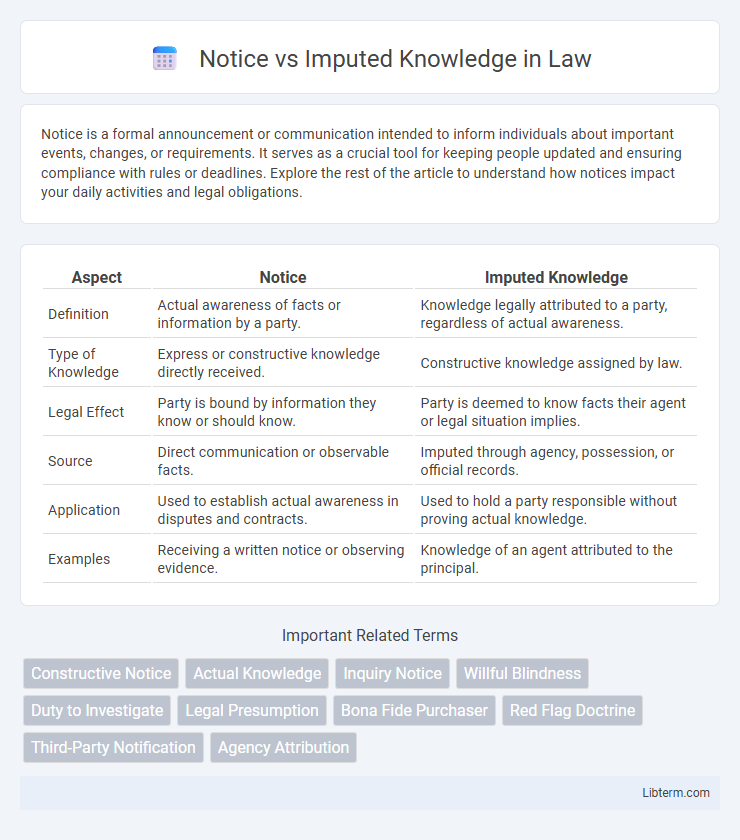Notice is a formal announcement or communication intended to inform individuals about important events, changes, or requirements. It serves as a crucial tool for keeping people updated and ensuring compliance with rules or deadlines. Explore the rest of the article to understand how notices impact your daily activities and legal obligations.
Table of Comparison
| Aspect | Notice | Imputed Knowledge |
|---|---|---|
| Definition | Actual awareness of facts or information by a party. | Knowledge legally attributed to a party, regardless of actual awareness. |
| Type of Knowledge | Express or constructive knowledge directly received. | Constructive knowledge assigned by law. |
| Legal Effect | Party is bound by information they know or should know. | Party is deemed to know facts their agent or legal situation implies. |
| Source | Direct communication or observable facts. | Imputed through agency, possession, or official records. |
| Application | Used to establish actual awareness in disputes and contracts. | Used to hold a party responsible without proving actual knowledge. |
| Examples | Receiving a written notice or observing evidence. | Knowledge of an agent attributed to the principal. |
Introduction to Notice and Imputed Knowledge
Notice and imputed knowledge are pivotal concepts in legal and business settings, defining what information parties are considered to have. Notice refers to the actual awareness or direct knowledge a person possesses about a fact or situation, while imputed knowledge assigns awareness to an individual based on the knowledge of another person, such as an agent or employee. Understanding these distinctions is essential for determining liability, contractual obligations, and the enforcement of rights in various legal contexts.
Defining Notice: Legal and Practical Perspectives
Notice, in legal and practical contexts, refers to the awareness or knowledge of a fact or circumstance required to trigger certain duties or obligations. Actual notice involves direct, explicit knowledge, while constructive notice, or imputed knowledge, arises when information is available and should be known through reasonable diligence. Understanding the distinction plays a critical role in property law, contract law, and liability assessments, influencing how responsibility and accountability are determined.
Understanding Imputed Knowledge
Imputed knowledge refers to the legal presumption that a person has knowledge of facts or information acquired by another party, typically within the same organization or agency. This concept plays a crucial role in determining liability, as courts attribute knowledge to individuals based on their relationship or position, regardless of actual awareness. Understanding imputed knowledge is essential for assessing responsibility in cases involving partnerships, employers and employees, or agents and principals.
Key Differences Between Notice and Imputed Knowledge
Notice involves actual awareness of facts or circumstances by a party, indicating direct knowledge of specific information, whereas imputed knowledge is legally attributed knowledge based on one's relationship or position, even if the person lacks actual awareness. Notice is dependent on evidence that a party has been informed or has perceived certain facts, while imputed knowledge arises from legal presumptions tied to agents, employees, or representatives in a fiduciary role. The key difference lies in notice requiring actual or constructive awareness, while imputed knowledge assumes knowledge through association or duty, impacting liability and decision-making in legal contexts.
Types of Notice: Actual, Constructive, and Inquiry
Types of notice in legal contexts include actual notice, where a party has direct knowledge of a fact; constructive notice, which occurs when information is legally presumed to be known due to its availability in public records; and inquiry notice, requiring a party to investigate further when circumstances suggest potential issues. Actual notice involves explicit communication or awareness, while constructive notice typically arises from recorded documents accessible through public registries. Inquiry notice mandates reasonable efforts to uncover hidden facts, often triggering legal obligations to investigate suspicious circumstances.
How Imputed Knowledge Operates in Law
Imputed knowledge operates in law by attributing the knowledge of one individual, usually an employee or agent, to another party such as an employer or principal, regardless of actual awareness. This legal principle ensures accountability by presuming that principals are informed of facts known by their agents during the course of their duties. Courts often apply imputed knowledge to prevent parties from escaping liability by claiming ignorance of relevant information known to their representatives.
Importance in Contract and Property Law
Notice and imputed knowledge are crucial concepts in contract and property law, impacting the enforcement of rights and obligations. Notice refers to the actual or constructive awareness a party has about facts or claims affecting their interests, while imputed knowledge attributes information known by an agent or representative to the principal. Understanding the distinctions ensures accurate assessments of parties' responsibilities, protects against fraud, and supports equitable outcomes in property transfers and contractual agreements.
Real-World Examples of Notice and Imputed Knowledge
In real estate law, notice refers to a party's actual awareness of a fact, such as a buyer seeing an unrecorded lien during a property inspection. Imputed knowledge occurs when information is legally attributed to a person, like a buyer being charged with knowledge of liens recorded in public land records, even if they did not personally review them. Courts often rely on these distinctions to determine interests and liabilities in property disputes.
Common Legal Issues and Disputes
Notice and imputed knowledge significantly impact liability and responsibility in legal disputes involving contracts and property law. Courts often examine whether a party had actual or constructive notice of facts, affecting claims of fraud, misrepresentation, or third-party rights. Determining imputed knowledge can lead to holding parties accountable for information their agents or representatives should have known, influencing the outcome of negligence and fiduciary duty cases.
Conclusion: Choosing the Right Standard
Selecting between notice and imputed knowledge hinges on the specific legal context and the nature of evidence available. Notice requires actual awareness of facts, while imputed knowledge assigns awareness based on reasonable inquiry or roles, impacting liability and duty decisions. Applying the proper standard ensures accurate legal outcomes and fair accountability in cases involving information awareness.
Notice Infographic

 libterm.com
libterm.com